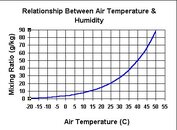UaVaj
Contributor
I am in sunny southeast florida.
this week's temperature during (1) the day is ~80 and (2) at night is ~60
this week's humidity during (1) the day 60% is and (2) at night is 90%
For longevity of filter. When is the best time to fill tanks?
My guess - would be during the day (late late afternoon) when humidity is at it's lowest. Can someone (1) confirm this or (2) correct this.
this week's temperature during (1) the day is ~80 and (2) at night is ~60
this week's humidity during (1) the day 60% is and (2) at night is 90%
For longevity of filter. When is the best time to fill tanks?
My guess - would be during the day (late late afternoon) when humidity is at it's lowest. Can someone (1) confirm this or (2) correct this.




